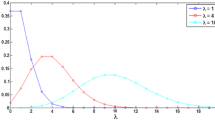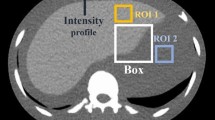Abstract
Cerenkov luminescence imaging(CLI) is an emerging molecular imaging technology able to optically visualize radioactive decay signals from medical isotopes and has found wide application in tumor diagnose, cancer therapy, drug development, intraoperative guidance, and so on. When Cerenkov luminescence data are collected, the high-energy particles from the radioactive nucleus will be detected by the sensitive CCD camera and lead to impulse noise. To suppress the impulse noise and improve the contrast of the useful signal to the background, the detection-based fuzzy switching median filtering framework is proposed in this paper. Several experiments were conducted respectively to investigate the statistical feature of the noise and to evaluate the performance of the proposed noise removal framework. The results show that the signal-to-noise ratio is improved after noise elimination. The proposed filtering framework outperforms the classical median filter in terms of root mean squared error and the structural similarity index. It also preserves the maximum value and the mean value in the regions of interest better than the median filter does. In addition, compared with the FLICMCDD algorithm, the proposed method works much faster while getting similar results.

Graphical abstract










Similar content being viewed by others
References
Cherenkov PA (1934) Visible emission of clean liquids by action of γ radiation. C R Dokl Akad Nauk SSSR 2:451–454
Xu Y, Liu H, Cheng Z (2011) Harnessing the power of radionuclides for optical imaging: Cerenkov luminescence imaging. J Nucl Med 52(12):2009–2018
Robertson R, Germanos MC (2009) Optical imaging of Cerenkov light generation from positron-emitting radiotracers. Phys Med Biol 54(16):N355–N365
Cho JS, Douraghy A, Olma S, Liu K, Chen YC, Shen CK, Silverman RW, Dam RM, Chatziioannou AF (2009) Cerenkov radiation imaging as a method for quantitative measurements of beta particles in a microfluidic chip. Phys Med Biol 54(22):6757–6771.
Spinelli AE, D'Ambrosio D, Calderan L, Marengo M, Sbarbati A, Boschi F (2016) Cerenkov radiation allows in vivo optical imaging of positron emitting radiotracers. Phys Med Biol 55(2):483–495
Liu H, Carpenter CM, Jiang H, Pratx G, Sun C, Buchin MP, Gambhir SS, Xing L, Cheng Z (2012) Intraoperative imaging of tumors using Cerenkov luminescence endoscopy: a feasibility experimental study. J Nucl Med 53(10):1579–1584
Chen X, Liang J, Cao X, Zhan Y, Cao X (2017) Harnessing the power of Cerenkov luminescence imaging for gastroenterology: Cerenkov luminescence endoscopy. Current Med Imag Rev 13(1):50–57
Li C, Mitchell GS, Cherry SR (2010) Cerenkov luminescence tomography for small animal imaging. Opt Lett 35(7):1109–1111
Spinelli AE, Ferdeghini M, Cavedon C, Zivelonghi E, Calandrino R, Fenzi A, Sbarbati A, Boschi F (2013) First human Cerenkography. J Biomed Opt 18(2):20502
Thorek DL, Riedl CC, Grimm J (2014) Clinical Cerenkov luminescence imaging of (18)F-FDG. J Nucl Med 55(1):95–98
Balkin ER, Kenoyer A, Orozco JJ, Hernandez A, Shadman M, Fisher DR, Green DJ, Hylarides MD, Press OW, Wilbur DS, Pagel JM (2014) In vivo localization of 90Y- and 177Lu-radioimmunoconjugates using Cerenkov luminescence imaging in a disseminated murine leukemia model. Cancer Res 74(20):5846–5854
Boschi F, De FS, Ugel S, Spinelli AE (2018) T-cell tracking using Cerenkov and radioluminescence imaging. J Biophotonics: e20180093-1-11
Xu Y, Chang E, Liu H, Jiang H, Gambhir SS, Cheng Z (2012) Proof-of-concept study of monitoring cancer drug therapy with Cerenkov luminescence imaging. J Nucl Med 53(2):312–317
Grootendorst MR, Cariati M, Kothari A, Tuch DS, Purushotham A (2016) Cerenkov luminescence imaging for image-guided cancer surgery. Clin Transl Imaging 4(5):353–366
Ruggiero A, Holland JP, Lewis JS, Grimm J (2010) Cerenkov luminescence imaging of medical isotopes. J Nucl Med 51(7):1123–1130
Gonzalez RC, Woods RE (2008) Digital image processing, Third edn. Pearson Education, Upper Saddle River, pp 343–345
Chen Y, Zhang Y, Shu H, Yang J, Luo L, Coatrieux J, Feng Q (2016) Structure-adaptive fuzzy estimation for random-valued impulse noise suppression. IEEE Trans Circuits Syst Video Technol 28(2):414–427
Singh N, Thilagavathy T, Lakshmipriya RT, Umamaheswari O (2017) Some studies on detection and filtering algorithms for the removal of random valued impulse noise. IET Image Process 11(11):953–963
Pok G, Liu JC (1999) Decision-based median filter improved by predictions.in: Proc IEEE ICIP,2:410-413
Eng HL, Ma KK (2001) Noise adaptive soft-switching median filter. IEEE Trans Image Process 10(2):242–251
Cao X, Li Y, Zhan Y, Chen X, Kang F, Wang J, Liang J (2016) Removing noises induced by gamma radiation from Cerenkov luminescence imaging using a temporal median filter. BioMed Res Int 2016:7948432-1-9.
Cao X, Sun Y, Kang F, Yi H, Zhao F, Su L, He X (2018) A novel denoising framework for Cerenkov luminescence imaging based on spatial information improved clustering and curvature-driven diffusion.J Innovative Opt Health Sci 11(4):1850017-1-8.
Zhang S, Karim MA (2002) A new impulse detector for switching median filters. IEEE Signal Proc Let 9(11):360–363
Wang SS, Wu CH (2009) A new impulse detection and filtering method for removal of wide range impulse noises. Pattern Recogn 42(9):2194–2202
Garnett R, Huegerich T, Chui C, He W (2005) A universal noise removal algorithm with an impulse detector. IEEE Trans Image Process 14(11):1747–1754
Wang Z, Bovik AC, Sheikh HR, Simoncelli EP (2004) Image quality assessment: from error visibility to structural similarity. IEEE Trans Image Process 13(4):600–612
Lee SB, Ahn SB, Lee SW, Jeong SY, Ghilsuk Y, Ahn BC, Kim E, Jeong H, Lee J, Lim D, Jeon YH (2016) Radionuclide-embedded gold nanoparticles for enhanced dendritic cell-based cancer immunotherapy, sensitive and quantitative tracking of dendritic cells with PET and Cerenkov luminescence. NPG Asia Mater 8(6):e281
D'Souza JW, Hensley H, Doss M, Beigarten C, Torgov M, Olafsen T, Yu JQ, Robinson MK (2017) Cerenkov luminescence imaging as a modality to evaluate antibody-based PET radiotracers. J Nucl Med 58:175–180
Boschi F, De Sanctis F, Ugel S, Spinelli AE (2018) T-cell tracking using Cerenkov and radioluminescence imaging. J Biophotonics, e201800093.
Funding
This work was supported in part by the Program of the National Key Research and Development Program of China under Grant Nos. 2018YFC0910600 and 2016YFC0103802; the Fundamental Research Funds for Central Universities JB171206; the National Natural Science Foundation of China under Grant Nos. 81627807 and 81571725; and the Fok Ying-Tong Education Foundation of China under Grant No 161104.
Author information
Authors and Affiliations
Corresponding author
Ethics declarations
Animal care and protocols are approved by the Fourth Military Medical University Animal Studies Committee, China.
Conflict of interest
The authors declare that they have no conflict of interest.
Additional information
Publisher’s note
Springer Nature remains neutral with regard to jurisdictional claims in published maps and institutional affiliations.
Rights and permissions
About this article
Cite this article
Chen, D., Zhu, S., Huang, Y. et al. Removal of random-valued impulse noise from Cerenkov luminescence images. Med Biol Eng Comput 58, 131–141 (2020). https://doi.org/10.1007/s11517-019-02069-9
Received:
Accepted:
Published:
Issue Date:
DOI: https://doi.org/10.1007/s11517-019-02069-9




